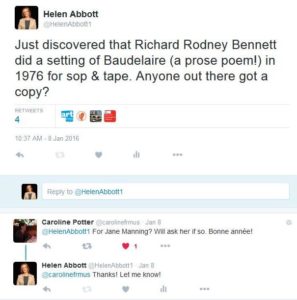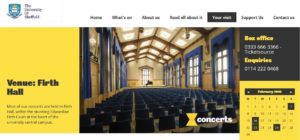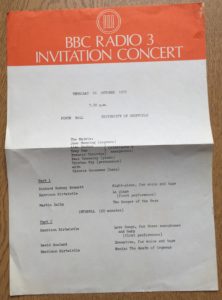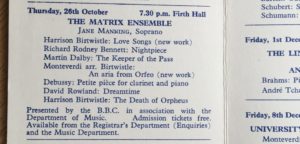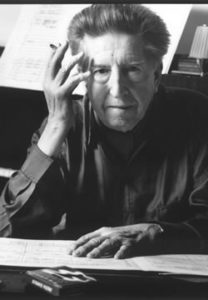By Dr Helen Abbott (Project Director)
Project Director Dr Helen Abbott explores how the project team unearth Baudelaire settings … and find him closer to home than expected!
Baudelaire comes out of the woodwork in all sorts of unexpected places. We’ve found him in Poland couched in death metal music, in America in avant-garde electronica, in France in the Chat noir cabaret. But little did we, as a team of researchers based at the University of Sheffield, expect to find him here.
Research twists and the power of Twitter
Earlier this month, as part of our data gathering process of song settings housed in existing datasets, we unearthed a library catalogue reference to a setting of Baudelaire’s prose poem ‘Les Bienfaits de la lune’ by 20th-century British composer Richard Rodney Bennett. I put out a call on Twitter and within minutes had a response from a fellow researcher at Kingston University (BSP associate Dr Caroline Potter) suggesting I follow up a lead with the British soprano Jane Manning.
Within half an hour, an email response came:
“As for RRB: Yes, the Baudelaire ( Les Bienfaits de la Lune) work is called NIGHTPIECE and was indeed written for me.”
What a coup to hear from the very singer for whom the piece was written! The search was still on to locate a recording, and through another series of email discussions with researchers at various UK institutions, a recording was located of a performance of the piece given on 26 October 1972, transmitted by the BBC.
This was a rare chance to hear an extraordinary piece of ethereal, almost eerie music for soprano and tape, through the filter of ageing recording technology. As well as Jane Manning’s virtuosic vocal gymnastics singing sections of the text in French, we also hear the tape with Richard Rodney Bennett playing the VCS3 synthesizer, as well as speaking and whispering parts of the Baudelaire text in English.
But I couldn’t have been more excited to then discover where the concert recording had taken place: here at the University of Sheffield, in our famous Firth Hall.
This is the very hall in which I myself have performed settings of Baudelaire (by Louis Vierne), and which I pass every day on my way to work.
To top it all off, our Concerts Producer was able to locate the programme booklet and concert invitation in our University of Sheffield Concerts Archive. So we have an almost complete set of materials as a record of this unique event, when Baudelaire was performed in Sheffield in Richard Rodney Bennett’s new work, completed in February of that year (1972).
We’d love to hear of upcoming performances of Nightpiece, though we know the master tape is in poor condition and hard to track down. In many ways, then, this is a rare gem, and it would be a shame to lose it forever. Richard Rodney Bennett’s own paraphrase of the Baudelaire text (from the recording) gives us a flavour of what he envisaged:
The moon, looking through a window and seeing a sleeping child, claims it for her own. She passes silently through the glass and spreads herself over the child. Its eyes turn green, its cheeks extraordinarily pale, and its eyes bizarrely large. The moon fills the room, like a luminous poison, and this living light speaks to the child. “You will be forever under the influence of my kiss. You will love the things which I love, and which love me. Water, clouds, silence, and night. The place you will never see, the lover you will never know. You will be loved by my lovers, courted by my courtesans. You will be the Queen of the green-eyed men whom I also have strangled. Those who love the sea, unknown places and lovers, those savage and voluptuous animals which are the emblems of their madness.”
Please note: copyright restrictions apply to the recording, and we are using it for research purposes only.

